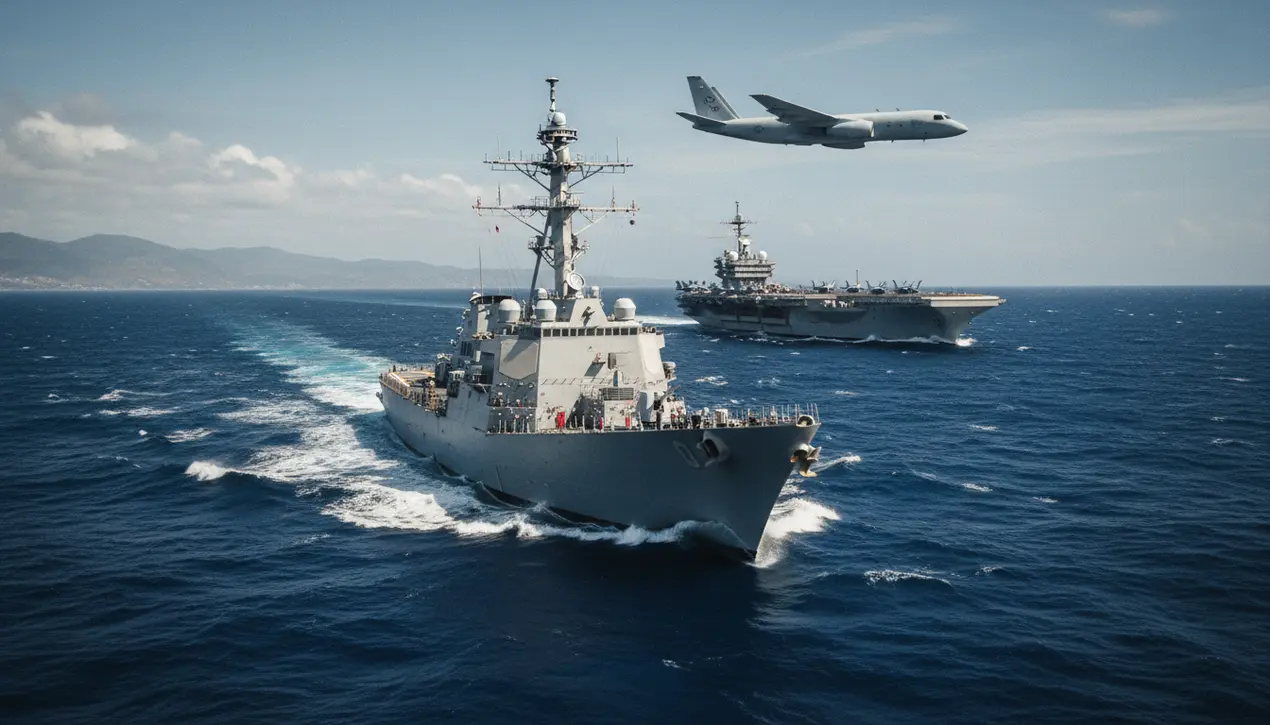
Politicsconflict & defenseMilitary Operations
US Military Builds Up Air and Naval Presence Near Venezuela
OL
Oliver Scott
15 hours ago7 min read2 comments
The strategic waters and airspace surrounding Venezuela are thickening with a palpable, calculated presence, as the United States military initiates a significant build-up of naval and air assets, a move officially justified by Washington as a necessary escalation in the protracted war on drug smuggling. This is not merely a routine patrol; it’s a deliberate projection of power into a region long considered a strategic backyard, and the implications ripple far beyond the interception of narcotics shipments.The official narrative, centering on stemming the flow of cocaine and other illicit substances destined for American streets, is a familiar one, echoing campaigns from the 1980s and 1990s. However, analysts observing the chessboard of hemispheric politics see a more complex gambit at play.The timing is conspicuously critical, arriving amid heightened tensions with the government of Nicolás Maduro, which the U. S.continues to recognize as illegitimate, favoring opposition leader Juan Guaidó. This military posture serves as a stark reminder of the immense pressure the Biden administration is willing to exert, a form of gunboat diplomacy for the 21st century where the threat is not just political isolation but tangible, overwhelming force.Historically, such shows of strength have preceded more direct intervention, from the blockade of Cuba during the Missile Crisis to the Panamanian incursion that ousted Manuel Noriega. The specific assets deployed—likely including reconnaissance aircraft like the P-8 Poseidon, destroyers capable of Aegis missile defense, and possibly even elements of a carrier strike group—are as much about intelligence gathering and signal-sending as they are about interdiction.They effectively establish a de facto quarantine, monitoring not just go-fast boats but also state-level military movements, thereby constraining Caracas’s options. The risk calculus here is immense.On one hand, a successful campaign could disrupt key cartel routes, delivering a tangible win for domestic policy. On the other, it risks a dangerous escalation with a regime that, while economically beleaguered, maintains significant military ties with Russia and China, and could interpret the build-up as a prelude to an invasion.A single miscalculation or a provocative maneuver by Venezuelan forces could spark an international incident with global repercussions, potentially drawing in other powers and destabilizing the entire Caribbean basin. Furthermore, the move is likely to be met with fierce condemnation from regional allies like Mexico and Brazil, who have consistently advocated for non-interventionist principles, potentially fracturing the unified front the U.S. seeks to maintain against Maduro.The ultimate scenario planning must account for a range of outcomes, from a forced negotiation where Maduro makes concessions on drug cooperation and political reforms, to a full-blown blockade that strangles the Venezuelan economy, to, in the worst-case, an armed conflict that would unleash a humanitarian catastrophe and a refugee crisis dwarfing current levels. The warships on the horizon are more than just tools for a drug bust; they are the most visible pieces in a high-stakes game of geopolitical poker, where the ante is the future of a nation and the stability of an entire hemisphere.
#featured
#US military
#Venezuela
#drug smuggling
#naval campaign
#air deployment
Stay Informed. Act Smarter.
Get weekly highlights, major headlines, and expert insights — then put your knowledge to work in our live prediction markets.
Comments
Loading comments...
© 2025 Outpoll Service LTD. All rights reserved.